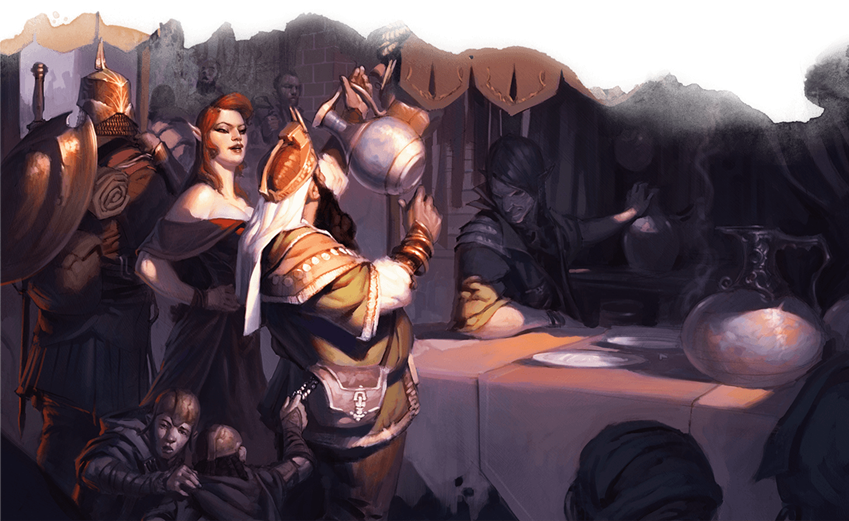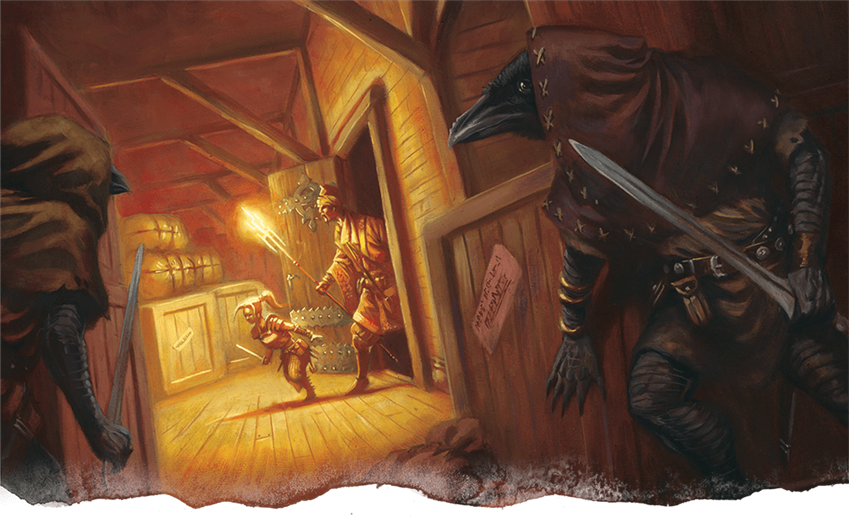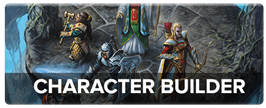House rules can make your D&D games more epic. If your game features lots of ability checks, and your characters use their skill and tool proficiencies all over the place, this new Talented Checks house rule can speed up your game, make your characters feel more like competent heroes, and make it easier to run mystery and social intrigue adventures. Let’s talk about Talented Checks!

Talented Checks
This house rule is short and sweet. Let’s start by stating it plainly here, and then we’ll dive into the nuances, interactions, and side effects this rule has as it echoes throughout the rest of the D&D rules. Here’s the house rule in its entirety:
If you’re proficient with a skill or tool, you automatically succeed on ability checks using that proficiency if the DC of that check is equal to or lower than 10 + your modifiers that apply to that check.
This is a fairly simple house rule, but it can have a massive impact on how your D&D game runs. It’s well-suited to social intrigue or mystery stories (like Waterdeep: Dragon Heist or adventures like The Styes in Ghosts of Saltmarsh), or any other adventure in which characters are expected to make a lot of checks.
This house rule even has uses in dungeon-crawling tales like Waterdeep: Dungeon of the Mad Mage, since it makes each class’s identity in the dungeon even more distinct. If a fighter has proficiency in Athletics, giving them the ability to automatically succeed on easy Strength (Athletics) checks lets their player feel like a competent action hero—which is the core of their class. Likewise, rogues can confidently pick locks that aren’t too beyond their skill, and wizards can comfortably succeed at Intelligence (Arcana) checks to decipher magical secrets, making them feel like all that studying they did in Candlekeep was worth something in the long run.

Passive Checks vs. Talented Checks
Most D&D players are at least passingly familiar with passive checks—particularly the most common type of passive check, a passive Wisdom (Perception) check. Your passive Wisdom (Perception) score is listed on your character sheet, and that value is equal to 10 + all modifiers that normally apply to the check, such as your Wisdom modifier and your proficiency bonus (if you’re proficient in the Perception skill).
Talented checks use the same formula as passive checks for determining success and failure, but they work differently. Here are some distinctions to keep in mind if you’re using this house rule.
Passive checks are always on; talented checks aren’t. When you enter a room in a dungeon, you automatically succeed at any Wisdom (Perception) checks that have a DC equal to or lower than your passive Wisdom (Perception) score. Even though a talented check can automatically succeed, you still need to actively choose to make an ability check.
You need to be proficient to make a talented check. Anyone can make a passive check. For instance, you still have a passive Wisdom (Perception) score even if you aren’t proficient in the Perception skill. Your passive score in that case is equal to 10 + your Wisdom modifier. Talented checks, however, can only be made by people who are proficient with the skill or tool being used. This helps protect the usefulness of characters that have invested resources into mastering a certain type of skill or tool.
Not all checks are passive checks, but any check can be talented. The rules of D&D aren’t clear on what checks can or can’t be passive. By the rules, any combination of ability scores and proficiencies can be made “passive,” but the only ones that are called out specifically by the rules are passive Wisdom (Perception) and passive Intelligence (Investigation)—the latter only shows up in the [feat]Observant[/feat] in the Player’s Handbook. That’s why those two passive scores are the only ones that appear on the D&D Beyond Character Sheet. If you want to make any other skill passive, you need to talk with your players (or ask your DM) and make it clear that’s what’s happening.
That’s not the case with talented checks. If you use this house rule, you’re making a clear statement to your players that if you’re proficient with a skill or tool, you can simply choose to succeed on easy checks using those proficiencies.

What about Reliable Talent?
Reliable Talent is a rogue class feature that allows you to “treat a d20 roll of 9 or lower as a 10” whenever you “make an ability check that lets you add your proficiency bonus.” This house rule is essentially expanding Reliable Talent to all characters, but with less dice rolling. This is only a problem if your game reaches 11th level and you have a rogue in your party; they’ll need to receive another mechanical bonus to replace the one that this house rule has essentially given to everyone.
A fine replacement for Reliable Talent is the bard’s Jack of All Trades class feature, which allows you to add half your proficiency bonus to any check that you wouldn’t otherwise add your proficiency bonus to. Even though its function is different, replacing Reliable Talent with Jack of All Trades as the rogue’s 11th-level class feature fulfils a similar role of improving their odds of success when making ability checks.
What about Temporary Proficiency?
Some class features, like the Knowledge Domain cleric’s Channel Divinity: Knowledge of the Ages feature, temporarily grants you proficiency with a skill or tool. Given a strict reading of the rules, this house rule allows you to make a talented check as long as you are proficient with a skill or tool; there’s no stipulation that you must always be proficient, just that you must be proficient when you make the check. This house rule certainly makes Knowledge Domain clerics better, but I don’t think it makes them particularly overpowered.
As with any house rule, it’s incumbent upon you and your table to work with your players and Dungeon Master to modify the rules to suit your needs.

What about Xanathar’s Guide to Everything?
Xanathar’s Guide to Everything gives Dungeon Masters and players a great deal of specific guidance on how to use tool proficiencies in fun and useful ways. Some of the fun of using these tool proficiencies relies on the tension of the dice; will you succeed at forging a signature with your calligrapher’s tools, even with its high DC? This house rule doesn’t make it more likely for characters to succeed at incredibly hard checks, but it does make it a guarantee that they’ll succeed at the easier checks, since they have to be proficient with a particular tool in order to attempt some of these specialized checks in the first place. I don’t think that this causes any problems, unless you really enjoy the uncertainty involved in possibly failing easy checks.
Xanathar’s also gives guidance on making downtime activities exciting. Some of these downtime activities involve making ability checks to determine how well you succeed at a certain activity. For instance, committing crimes while in town requires you to choose a DC, and then make several checks against that DC. If your characters just want a little bit of easy cash, it could become boring if they choose a DC that they can automatically beat using a talented check. Removing the risk of failure could make checks like this rote and mundane.
On the other hand, it’s up to you to decide if this is a bad thing or not. Your party may have a little more gold than usual, but what’s wrong with that? If one of your character is a master thief who just wants a reliable cash flow, let them live out the fantasy of pulling off a string of flawless low-profile capers week after week. But you’ve seen enough heist movies to know they’ll eventually want more, right? Thieves in movies, plays, and TV shows have massive egos and poor impulse control; they’re always looking for something bigger, badder, and shinier.
If this house rule causes crime (or whatever your players’ go-to downtime activity is) to become routine, try upping the ante yourself. Drop hints about the “Grand Diamond of Cormyr” being put on display in the Waterdeep Metropolitan Museum for a tenday only in one month’s time. This isn’t just a standard crime; this is a crime with DCs of 30 across the board. The characters are going to need to do a lot of legwork to rig these checks in their favor, and talented checks won’t help them here.
Do you have any questions about this house rule? How would you use it in your D&D games? And do you have any house rules of your own? Let us know in the comments!
Special thanks to @ThinkingDM for his thread about passive skills, which inspired me to revise and expand my original draft of this house rule.
Create A Brand-New Adventurer Acquire New Powers and Adventures Browse All Your D&D Content
 James Haeck is the lead writer for D&D Beyond, the co-author of Waterdeep: Dragon Heist, Baldur's Gate: Descent into Avernus, and the Critical Role Explorer's Guide to Wildemount, a member of the Guild Adepts, and a freelance writer for Wizards of the Coast, the D&D Adventurers League, and other RPG companies. He lives in Seattle, Washington with his fiancée Hannah and their animal companions Mei and Marzipan. You can find him wasting time on Twitter at @jamesjhaeck.
James Haeck is the lead writer for D&D Beyond, the co-author of Waterdeep: Dragon Heist, Baldur's Gate: Descent into Avernus, and the Critical Role Explorer's Guide to Wildemount, a member of the Guild Adepts, and a freelance writer for Wizards of the Coast, the D&D Adventurers League, and other RPG companies. He lives in Seattle, Washington with his fiancée Hannah and their animal companions Mei and Marzipan. You can find him wasting time on Twitter at @jamesjhaeck.











-
View User Profile
-
Send Message
Posted Sep 15, 2020I kind of do this already in my games. If I feel like a certain player character would succeed in something, and failure would result in them looking incompetent - rather than heroically unsuccessful - then I let them automatically succeed. Which is basically what is happening here - an experienced thief would look incredibly foolish if they fluke-failed to pick the lock on a child's toybox. Unless that toybox hides a dark secret... but I'm getting sidetracked.
The point is: heroes who are skilled at something should only risk failure on the very challenging stuff! Otherwise failure undercuts their supposed proficiency and heroic quality. And, as you said, automatic success at tasks otheres struggle with can reinforce their feeling of heroic mastery.
However, it is nice to have it as a formalised rule. I think this was useful; it will help me be more conscious and deliberate in using this. Thanks very much for posting this!
-
View User Profile
-
Send Message
Posted Sep 15, 2020i agree but mostly it is not that important but why and how did you think of this
-
View User Profile
-
Send Message
Posted Sep 16, 2020kinda broken my wizard could just scribe 9th level spells into his book without fail (+9)
-
View User Profile
-
Send Message
Posted Sep 16, 2020I'm not sure I understand. There's no check required for a wizard to successfully scribe spells into their spellbook, just a materials cost.
-
View User Profile
-
Send Message
Posted Sep 16, 2020My dm makes me make a arcana check
-
View User Profile
-
Send Message
Posted Sep 16, 2020In that case, you DM is using a house rule of their own. If you want to use this house rule, you should talk with your DM to figure out ways to make sure they don't come into conflict (like how you just described).
-
View User Profile
-
Send Message
Posted Sep 16, 2020if you scribe from a scroll you need to do a check to see if it success :)
"A wizard spell on a spell scroll can be copied just as spells in spellbooks can be copied. When a spell is copied from a spell scroll, the copier must succeed on an Intelligence (Arcana) check with a DC equal to 10 + the spell's level. If the check succeeds, the spell is successfully copied. Whether the check succeeds or fails, the spell scroll is destroyed."
it is from the DMG magic items spell scroll.
https://www.dndbeyond.com/magic-items/spell-scroll
-
View User Profile
-
Send Message
Posted Sep 16, 2020-
View User Profile
-
Send Message
Posted Sep 16, 2020Ah, from a scroll rather than another spellbook. That makes sense.
-
View User Profile
-
Send Message
Posted Sep 18, 2020A way to address the downtime crime spree could be for the DM to add 1 to the DC for each crime committed in a specified period of time. Eventually the DC would exceed the threshold for auto success and they would have to start rolling. This would represent the local law enforcement investigating and committing more manpower to catch the culprit.
There are lots of replies and I haven't read them all, so apologies if this has already been suggested.
-
View User Profile
-
Send Message
Posted Sep 18, 2020I like it! I'm going to introduce a version of it in my campaign. I'll let each player pick one skill and one tool proficiency.
-
View User Profile
-
Send Message
Posted Sep 18, 2020I'm letting my players pick one skill proficiency and one tool proficiency (if they have one) in which to be talented.
If a class feature gained later replicates it, I'll let them switch it out.
-
View User Profile
-
Send Message
Posted Oct 19, 2020So people can finally overcome the whole "Giant burly fighter can't break a door, -5 strength wizard can" thing?
-
View User Profile
-
Send Message
Posted Oct 30, 2020"If one of your character is a master thief who just wants a reliable cash flow, let them live out the fantasy of pulling off a string of flawless low-profile capers week after week."
Right... but as a DM, there is another simple fix if your thief falls into this easy way to make money. Reliable talent works for NPCs too. So they suddenly discover they are trying to pick-pocket another rogue who is a master of disguise, pretending to be a simple townsperson, because the local watch had realised there was a thief in town and wanted to catch them. The DC is actually 30, not 10. They are caught, and arrested.
Nothing is always a dead cert.
-
View User Profile
-
Send Message
Posted Oct 30, 2020Yes, I agree. I get a bit fed up with my DM who overdoes the dice rolls. When I'm asked as a lvl 10 wizard to roll an Acana check after I cast identify on simple magic item... & then because I role a 3 (+9) I'm told I have no idea what the item is. So I just have to do it again the next day. Boring. Just unnecessarily slows the game down. Let it flow quickly for easy tasks & keep the story moving. Just bring in the dice rolling when it's hard, or when PCs start abusing the DC10 'always succeeds' rule (or make it DC 11).
-
View User Profile
-
Send Message
Posted Oct 30, 2020Why would you think a Wizard (of any level) should be able to just automatically identify any magic item they encounter? If you find a magical artefact in a dungeon there should absolutely be every chance you won't know what it is. Even an archmage (or archfey) can encounter something they've never seen before, or something completely unique.
-
View User Profile
-
Send Message
Posted Oct 31, 2020While that's true, casting Identify on a bag of holding and failing because of a bad roll at level 10+ is kinda like saying a 10th level warrior can't tell the difference between a dagger and a shortsword.
-
View User Profile
-
Send Message
Posted Oct 31, 2020There are at least three different variations on bags of holding one of which eats your stuff. A fighter can freely tell that something is a dagger or a shortsword because it's obvious which is which; it isn't necessarily obvious that an item is magical (without Detect Magic) and even once you know, you don't know what it does. Even common magic items that your wizard is very familiar with could be enchanted to do something other than what you expect.
-
View User Profile
-
Send Message
Posted Oct 31, 2020The point of the article is not to provide a way to get out of any rolls - it is to give a guide to what counts as trivial to your character after all the experience and practice they've done. Since we're not wizards in a fantasy world, we probably cannot fathom how easy it is to figure out what is the nature of the information you get from an identify spell and how hard it is to tell the difference between a bag of holding and a bag of devouring. It is very likely that for a high level wizard, that's as easy as telling the difference between a dagger and a sword. But in general, allowing your characters to pass checks that are trivial to them without rolls so they can focus on the challenges makes a better story and a more enjoyable game. For me that includes identifying Common and Uncommon items with a single Identify spell for a level 10+ wizard, if their intelligence is high enough.
I would like to emphasize at this point: we're not talking about looking at an item and just telling by experience what it is. We talk about casting a spell, that when cast on a magic item, lets you "learn its properties and how to use them, whether it requires attunement to use, and how many charges it has, if any. You learn whether any spells are affecting the item and what they are. If the item was created by a spell, you learn which spell created it."
In fact, the phrasing of the Identify spell implies that you simply just learn every details of an item, no roll involved at all... so we're already debating homeruling mechanics, which means everyone's right at their own table anyway. But let's put that aside for now and assume we are using some skill check rule that assigns DCs to items. I think we can agree that the rarity of the item would give the base DC - the Common and Uncommon items closer to DC10, the very rare ones possibly reaching 20 or higher. Wizards of level 10+ are rarely recluse hermits that never learn about anything - in fact your most common wizard is always eager for knowledge and reads a lot of books, so let's not get into "but your 345 year old 12th level high elf wizard surely never heard of a... broom of flying!" because that's just silly talk. Also taken that the spell's casting time is 1 minute (+10 minute if cast as a ritual), it's safe to assume it will not be used in combat or other stressful situation that would increase any DCs, which means they could have about 6 rolls per hour - even more if they have spell slots to burn. Eventually they would make it, but are you really here to play "how many rolls do you need to make to figure out this trivial thing", or you'd rather face that dragon in the next town?
In your specific mention of the bag of devouring: that item was meant to be indistinguishable from a bag of holding, until the surprise hits in. Now usually cursed items are marked as cursed, and identify would usually not reveal that curse, although the rules are a bit hazy even on that so that would invite a whole article of discussion; but the idea would be that even if the wizard rolls very high on an arcane check, they would fail to differentiate the bag of devouring from a bag of holding. Which leads to the very practical solution: when a wizard casts Identify on a bag of holding or a bag of devouring, they would identify it as a bag of holding. If I would use arcana checks to put more dice rolling in the game, a very high roll would still identify it as a bag of holding either way.
Tl;dr: less time spent on rolling for trivial things lets players enjoy more challenges and meaningful rolls
Tl;dr 2: the article is not trying to force you to waive every roll at the table. The article is about giving a guideline how to decide if a skill check is just a tedious annoyance and should be skipped to get to the interesting parts faster.
-
View User Profile
-
Send Message
Posted Oct 31, 2020Please note the part where PGB8000 said "after I cast Identify". There isn't supposed to be a roll to determine what the item is when you cast that spell; it just does it's thing.
Hell, in 5E, anyone who spends an hour examining any magic item, gets 100% of the information on what it does, and how to activate it. Including the specific and precise Command Word.